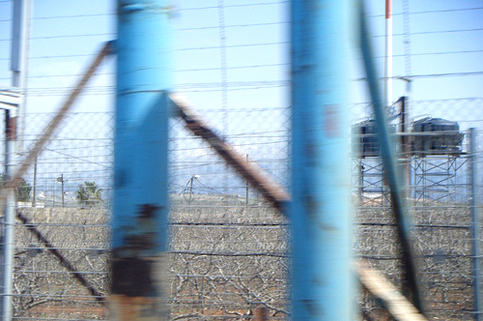Four documentarians look back at Palestine, and Lebanon
- Babel Theater hosts Cinema al-Fuqdan to mark the Nakba’s 60th anniversary

- Photo: Palestine/Lebanon border. Daily Star. Saturday, June 21st, 2008
BEIRUT: The peoples of Lebanon and Palestine have an ambivalent relationship. In the years since the terms “Lebanon” and “Palestine” were assigned their 20th-century political meanings, they have accumulated meaning, just as the experiences of their citizens have diverged.
The animosities souring the relationship between some Lebanese and Palestinians dates from the creation of the state of Israel in 1948. The Nakba (imperfectly translated as “Catastrophe”) propelled waves of refugee migration north, refugees who were politicized in the 1960s – which in its most recent variation has acquired a jihadi hue, thanks to the three-month-long struggle between the Lebanese Army and the multi-national militant group Fatah al-Islam.
Recent political history has blackened an older, more amicable relationship that preceded the arrival of French and British imperialism – whose Mandate borders, with the French to the north and the British to the south, obstructed an organic human traffic. Before this, the borders separating pre-Mandate “Lebanon” and “Palestine” were so nominal that individuals and families moved back and forth at will. The Nakba only reinforced that border.
From Sunday to Tuesday Hamra’s Babel Theater will host Cinema al-Fuqdan – loosely “Cinema of Loss” – a brief film series organized to mark the 60th anniversary of the Palestinian Nakba. The event will screen documentary films from four prominent Palestinian filmmakers – Mustafa Abu Ali, Nizar Hassan, Hany Abu Assaad and Michel Khleifi.
Abu Ali, Hassan and Abu Assaad will all be on hand to host their screenings and participate in a roundtable discussion on the state of Palestinian cinema, hosted by art critic and Al-Zawaya magazine editor Pierre Abi Saab.
Born in Jerusalem in 1940, Abu Ali is one of the pioneers of Palestinian documentary film. He completed his film studies in London in 1967 and in 1968 was one of the co-founders of the PLO’s documentation project, the Palestine Film Unit. He went on to found Beirut’s Palestinian Cinema Institution in 1971, the Palestinian Cinema Group, also in Beirut, in 1972, re-launching the group in Ramallah in 2004.
He has written, produced and directed 30 documentary films and won 13 international film festival prizes. Cinema al-Fuqdan marks Abu Ali’s first return to Beirut since 1982, when he left Lebanon with the PLO.
Two of Abu Ali’s documentaries will be screened. “Zionist Aggression” (1972) is a 22-minute document of the aftermath of a September 8, 1972, Israeli Air Force bombardment of Palestinian refugees and Lebanese villagers in South Lebanon.
“They Do Not Exist” (1974) is a 24-minute documentary response to Israeli politicians’ assertion, au courrant at the time, that Palestine and the Palestinian people did not exist. Abu Ali’s footage was shot at the former Nabatiyeh Palestinian refugee camp, three-quarters of which was destroyed by Israeli air raids in 1974.
Hany Abu Assaad shot to international acclaim with his 2005 feature film “Paradise Now,” which follows the travails of two friends who have been selected to carry out a suicide mission inside Israel. Born in Nazareth in 1960, and currently resident in Europe and America, Abu Assaad also directed the well-known 2003 feature “Rana’s Wedding” and the 2004 documentary “Ford Transit.”
Cinema al-Fuqdan will screen his 2000 documentary “Nazareth 2000,” which follows the director’s return to his hometown on the eve of the millennium. Set against the riots surrounding a square to which both Nazareth municipality and the Muslim community lay claim, Abu Assaad depicts the town’s idiosyncrasies through the wry lens of a pair of gas station attendants who’ve been working at the square’s service station for decades.
The celebrated short documentary by award-winning filmmaker Michel Khleifi “Maaloul Celebrates its Destruction” will also be projected. The documentary follows residents of the Galilee village of Maaloul, which Israel destroyed in 1948, as they visit the site of their former home – a journey they were then only allowed to make on Israel’s “independence day.”
The event will also screen a pair of documentaries by 48-year-old Nazareth-based filmmaker Nizar Hassan. His 1994 film “Isteklal” (Independence) asks why Palestinians with Israeli citizenship should celebrate “Israeli Independence Day,” which in the Palestinian national narrative is the Nakba.
Hassan’s 2008 work, “Janoub” (South), will likely also be his most-controversial of these films for Lebanese audiences. The documentary was provoked by an article “To be a Shiite Today,” a caustic, Hizbullah-critical piece that appeared in Lebanon’s An-Nahar newspaper in August 2006, during the 34-day Israeli bombardment of this country.
Among the responses provoked by the article was a lively discourse among Arab intellectuals about “Shiite identity.” It also motivated Hassan to interview five Lebanese of different genders, generations and leanings who happen to have “Shiite Muslim” on their identity papers. The film delves into their various shades of opinion concerning their religious belonging and its relationship to history, politics, personal struggle and education.
It may be a surprise to some in the audience to learn that, for all their differences, all five agree upon their dislike of Lebanese sectarianism. – the Daily Star
Cinema al-Fuqdan screens at Hamra’s Babel Theater on Sunday (from 8 p.m.), Monday and Tuesday (from 8 p.m.). Seating is free of charge. For more information please call +961 3 355 822.


